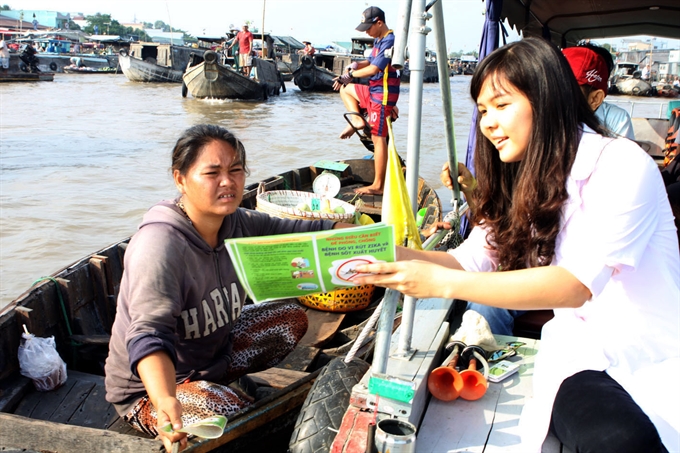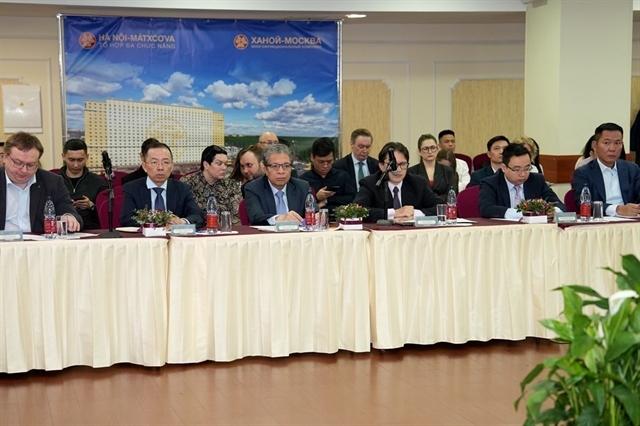 Society
Society

Health ministers from ASEAN member states convened a teleconference yesterday seeking ways to combat Zika virus, which has hit many parts of Southeast Asia.
 |
| A medical worker disseminates preventive measures against malaria and the Zika virus for people living and working on the floating Cái Răng Market in the Mekong Delta’s Cần Thơ City. — VNA/VNS Photo Dương Ngọc |
HÀ NỘI – Health ministers from ASEAN member states convened a teleconference yesterday seeking ways to combat the Zika virus, which has hit much of Southeast Asia.
As of yesterday, seven out of 10 ASEAN countries recorded Zika infections, except for Laos, Brunei and Myanmar.
Thailand and Myanmar reported the viral disease in 1954 and 1969, respectively, but it has yet to erupt into outbreak. Since 2012, the number of cases in 13 Thai cities and provinces surged to 314.
As many as 12 new cases of Zika were reported in Singapore last weekend, bringing the total number to 381 since the start of the outbreak on August 27, according to the National Environment Agency (NEA) of Singapore.
As of last Friday in Việt Nam, three people in HCM City, the central provinces of Khánh Hòa and Phú Yên were found infected with the virus.
The Vietnamese health ministry forecast that more infections were likely to be reported in the country in the near future.
Speaking at the event, Health Minister Nguyễn Thị Kim Tiến said Việt Nam has raised public awareness of Zika prevention, especially at international airports and border gates and called for financial aid.
Concluding the event, participants issued a joint statement detailing co-operation in increasing monitoring efforts in each country, improving information exchange, surveillance and countermeasures, as well as mosquito control and management of larvae breeding grounds.
More action!
The HCM City Department of Health is stepping up preventive methods against the spread of the Zika virus after two foreigners tested positive with the virus.
One of the foreigners, a German woman who works in the city, tested positive for the virus while she was visiting Japan. A Taiwanese man, who had travelled to Trà Vinh Province, tested positive after returning to Taiwan.
The health department told district-level preventive health centres to continue spraying chemicals to destroy mosquitoes and larvae. Areas at high risk should be monitored to minimise the multiplication of mosquitoes.
Education on preventive health measures should also be provided for residents, especially pregnant women, the department said.
Surveillance of infections has been strengthened as well. The city’s 30 hospitals are required to report any incidence of communicable disease, including Zika, to city authorities.
According to the department, only 20 per cent of patients infected with the Zika virus have symptoms such as fever. The department said that most patients have had mild cases and have recovered without specific treatment.
To deal with the spread of Zika in Singapore, the HCM City International Health Quarantine Centre is inspecting arriving aircrafts from Singapore and spraying pesticide to kill mosquitoes, if necessary, Nguyễn Hồng Tâm, the centre’s acting director, told Việt Nam News.
The centre is screening all arriving passengers for fever at Tân Sơn Nhất International Airport.
When passengers with suspected symptoms are detected, they will be stopped by a health quarantine officer for examination and epidemiological investigation.
If there is a strong suspicion of infection, they will be transferred to a hospital for isolation.
The quarantine room, nearby areas and means of transport at the airport will be sprayed to prevent the Zika virus from spreading.
Warnings and precautions about the Zika virus and preventive methods are being provided to passengers and staff working at the airport.
As many as 2,500 passengers from Singapore come to HCM City via the airport every day.
Wolbachia bacteria
Mosquitoes carrying the Wolbachia bacteria, which have been intentionally released on Trí Nguyên Island in Khánh Hòa Province since 2013 in an experiment to control dengue fever, could control Zika, according to the Ministry of Health.
Wolbachia bacteria can stop the dengue fever virus from replicating inside mosquitoes that transmit the disease.
In April, the province recorded one Zika incidence. Since 2013, the island has had only one incidence of dengue fever.
The province’s People’s Committee has approved releasing mosquitoes with Wolbachia bacteria in four more wards in Nha Trang City.
Between 2018 and 2021, mosquitoes with Wolbachia will be released in two or three more provinces to control dengue fever. —VNS




